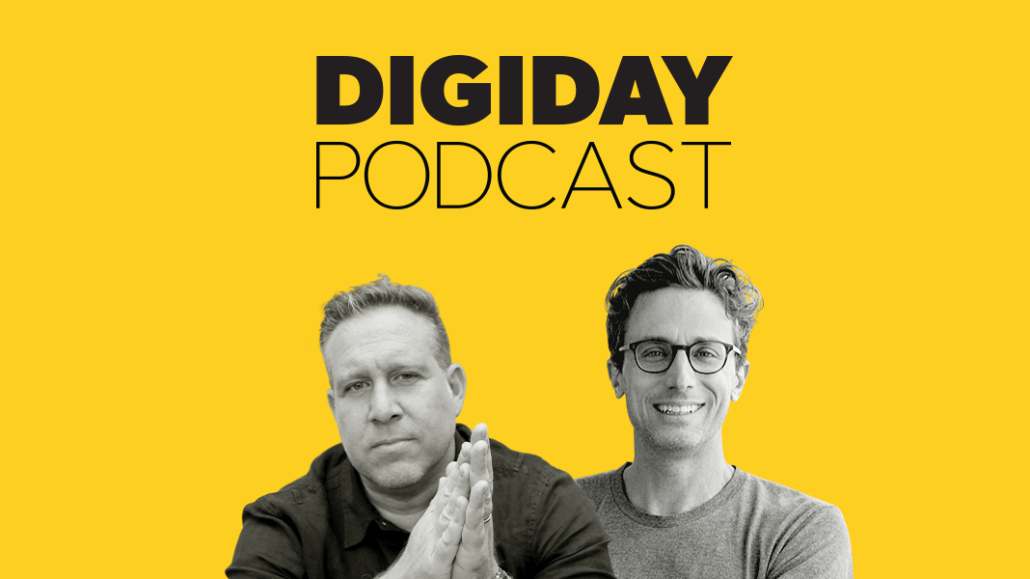Secure your place at the Digiday Media Buying Summit in Nashville, March 2-4
Jonah Peretti and Rich Antoniello explain why BuzzFeed is buying Complex Networks

Subscribe: Apple Podcasts | Stitcher | Google Play | Spotify
The wave of media consolidation is cresting again. The latest example is BuzzFeed’s acquisition of Complex Networks. BuzzFeed CEO Jonah Peretti and Complex Networks CEO Rich Antoniello joined the Digiday Podcast to talk about the deal.
The conversation with Peretti and Antoniello ranged from how Complex Networks will fit inside BuzzFeed to how BuzzFeed’s brands could cross over into Complex’s properties like ComplexCon and vice versa. What came through in the interview is how the two executives see their respective companies as being in a better position together rather than going it alone in an industry dominated by giant tech platforms and other major media companies that continue to merge.
“In this day and age, how difficult it is being an independent publisher, I think it’s only gotten more and more difficult and the pandemic heightened that,” Antoniello said.
Becoming a media conglomerate comes with complexities, though.
“You can tell in companies that merge everything together and have some chief content officer who makes every piece of content the same — I mean, it just doesn’t work,” said Peretti. “You need editorial independence and that flows through even to the business and to the partnerships you do and brand licensing deals and native advertising and branded content.”
Here are a few highlights from the conversation, which have been lightly edited for length and clarity.
Why Complex Networks will have its own CEO
Peretti: There’s a bunch of things that they do that really all we can hope for is that BuzzFeed could maybe help promote or add some additional distribution. But then there’s other areas where maybe there’s more collaboration. But the reason Complex will have a CEO is we’re seeing it as a really great business and franchise that needs to have its independence.
How BuzzFeed’s and Complex Networks’ businesses compare and contrast
Antoniello: The more I spoke to Jonah and the more our management teams got together and the more we looked at each other’s businesses and the level of diversification of both businesses but how we complementary we are. Our strength in longer-form content, their strength in shorter-form content. Their incredible e-commerce engine that has both affiliate as well as premium merchandise; our very IP and premium merchandise type of e-commerce.
How BuzzFeed will manage two separate food properties
Peretti: Tasty is a very pop brand. It’s a mass scale-type of brand. And First We Feast is a brand more of emerging culture and things that are coming next. I like Tasty and First We Feast both, but as a consumer, I would be really bummed out if they’ve merged together and had their voices diluted. Tasty needs to pursue its path and the same with First We Feast.
How BuzzFeed’s Tasty can sell Complex Networks’ hot sauce
Antoniello: We have this little line of hot sauces and hot honey [tied to Complex Networks’ show “Hot Ones”]. I’m dying to get those products in the hands of the talent at Tasty. Let’s sell some more product. Let’s make some recipes with our product and make some more money and provide more value to the end-consumer.
More in Media

Digiday+ Research: Dow Jones, Business Insider and other publishers on AI-driven search
This report explores how publishers are navigating search as AI reshapes how people access information and how publishers monetize content.

In Graphic Detail: AI licensing deals, protection measures aren’t slowing web scraping
AI bots are increasingly mining publisher content, with new data showing publishers are losing the traffic battle even as demand grows.

In Graphic Detail: The scale of the challenge facing publishers, politicians eager to damage Google’s adland dominance
Last year was a blowout ad revenue year for Google, despite challenges from several quarters.








